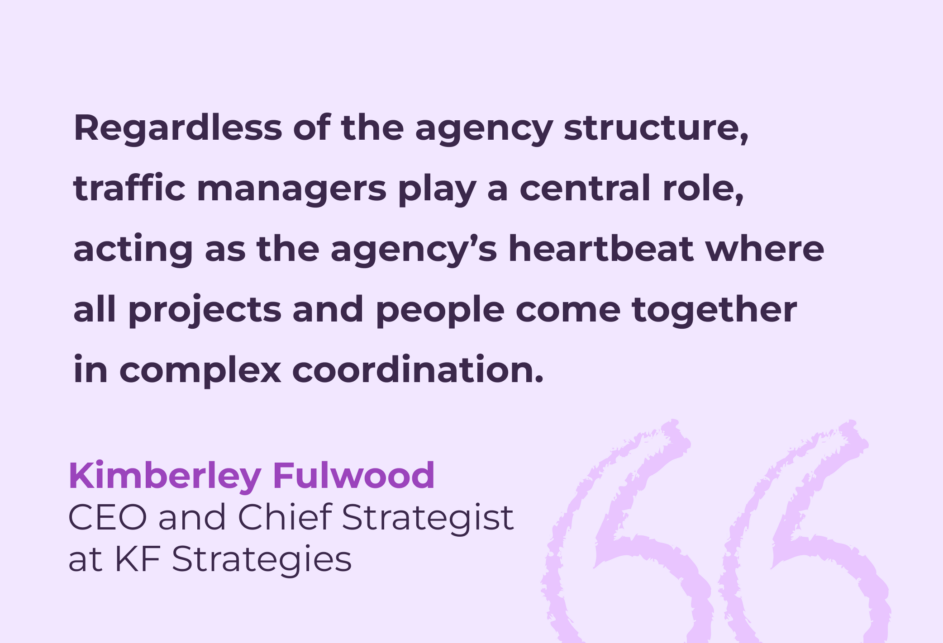Hear the words “traffic manager” and you might think of someone standing on a freeway, wearing headphones and an orange vest, while using wands to direct people and keep them moving.
When it comes to an agency traffic manager specifically, that vision isn’t that far off—except that there aren’t actually any roads involved here.
An agency traffic manager focuses on the flow of work within an agency. From intake all the way to delivery, they plan timelines, monitor tasks and resources, and ensure on-time completion of every single project the agency takes on.
Orange vest or not, it’s a crucial role in an agency. But it’s also one that’s often overlooked or misunderstood. We’re here to clear the air, with answers to all of your burning questions about agency traffic managers.
For expert insights, we spoke with:
- Tara Brzozowski, Owner and Operator of Showcase Communications, a strategic marketing communications firm
- Kimberley Fulwood, Founder, CEO, and Chief Strategist of KF Strategies, an agency that helps in-house marketing teams improve their operations and profitability
They’re quoted throughout the article with their perspectives on what agency traffic managers do and why they’re important.
In this article 📖
What is an agency traffic manager?
An agency traffic manager (sometimes called a production manager) maintains a bird’s-eye view of every single thing an agency is working on. They focus on keeping the agency out of a jam—whether that’s overbooking, missing deadlines, or scheduling conflicting work.
A typical agency works on an assortment of projects for a variety of clients, all at the same time. Work flows in and it flows out. Over and over again. The workload is fluid and ever-changing, which makes the whole thing feel like a big game of Tetris.
If this deliverable is pushed back, what can slide up in its place? Does the agency have the capacity to take on more work right now? What sort of lead time do they need? If this one task is delayed, how much wiggle room is there to adjust the schedule without impacting the final deadline?
Agency traffic manager skills
If your head is spinning, we don’t blame you. It’s complex, and this type of role is the best fit for people who are detail-oriented, organized, dedicated planners, and able to handle pressure and conflicts.
“The job can be very stressful at times. Traffic managers also need to mediate conflicts between team members and departments,” explains Tara.
“In my own journey, I learned that being a traffic manager meant being a bit of vinegar and sugar—a perfect blend of assertiveness and kindness,” adds Kimberley.
“It’s about holding even the highest authorities accountable while remaining respectful. Because in this business, it’s not personal. It’s about crafting exceptional work while maintaining professional relationships.”
What does an agency traffic manager do?
The agency traffic manager is essentially the keeper of the schedule. They have some level of oversight into every single thing the agency is working on. They need that holistic perspective in order to assign, plan, and schedule work effectively.
If they aren’t aware of a certain campaign or deliverable and don’t plan it into the agency’s workflows, for example, that can send the whole row of dominoes toppling over.
“Traffic managers play a crucial part in streamlining agency operations,” explains Kimberley. “They oversee the smooth flow of tasks between departments, preventing bottlenecks and delays.”
That means the main responsibility of the traffic manager is to maintain a comprehensive view of everything the agency is doing so that they can do things like:
- Determine the agency’s ability to take on new work requests and within what timeframe
- Assign work and keep workloads balanced across the team
- Ensure the agency delivers work by (or ahead of) the agreed-upon deadline
- Improve or maintain the agency’s utilization rate, aiming for a high percentage of billable hours
What does a typical day look like for an agency traffic manager?
So traffic managers are the ones keeping an eye on all of the moving parts. But what does that actually look like on a daily basis?
A typical day in the life of a traffic manager could include:
✅ Checking for new work requests or projects that need to be assigned
✅ Analyzing resources and schedules to get a sense of what’s possible
✅ Assigning tasks and work with those limitations in mind
✅ Building schedules for campaigns, projects, and deliverables
✅ Communicating with teams to stay on top of progress or potential roadblocks
✅ Updating agency leadership about workload, resources, and progress
✅ Checking notifications to keep a close eye on work progress and schedules
✅ Adjusting schedules and commitments when changes come up
✅ Creating and analyzing reports to identify process improvements for future work
Put simply, everything the traffic manager does is to help the agency keep work flowing, and to make sure they’re maximizing their billable time and resources as efficiently as possible (without overpromising and overextending).
It’s part art and part science.
Ad agency traffic manager (spotlight)
An advertising agency traffic manager is a more focused and specific type of traffic manager. As the name implies, this person is a traffic manager at an advertising agency.
So what does a traffic manager do in an advertising agency specifically? Much like with any other type of agency, they’re primarily focused on the flow of work and ensuring things get done on time. However, in an ad agency, they might also have the added complexity of managing the scheduling and placement of the advertisements themselves.
For example, that could mean ensuring that Client A’s radio advertisement plays on the right radio station within the right listening hour. Or confirming that Client B’s TV spot is scheduled for the right broadcast.
This aspect can also involve the use of some more specialized advertising agency traffic management systems. Some TV stations and radio networks even have designated traffic managers (often called broadcast traffic coordinators) that control the advertising schedule.
The specifics can vary, but regardless, a traffic manager at an ad agency is largely focused on the same thing as any other traffic manager: making sure work flows smoothly.
How the traffic manager fits into the agency team
The agency traffic manager plays an undeniably important role, but because they have oversight of everything the agency is doing, it’s challenging to understand how and where they fit into the team.
There isn’t one “right” answer here—different agencies use different hierarchies and organizational charts depending on their size and setup.
Who does a traffic manager report to? It depends on the agency’s size, internal structure, and priorities, shares Tara. The traffic manager could work under the:
- Head of project management
- General manager
- Managing director
- Operations manager
- Another role that heads up strategy and planning
“In smaller agencies, the traffic manager is more likely to report directly to the agency director, as the organizational hierarchy tends to be simpler and more streamlined,” Tara says.
And while the traffic manager stays zoned in on the schedule, they certainly don’t work in isolation. They frequently have to communicate and collaborate with other people throughout the agency—especially project owners, project managers, and account managers.
“Regardless of the agency structure, traffic managers play a central role, acting as the agency’s heartbeat where all projects and people come together in complex coordination,” explains Kimberley.

Traffic manager vs. project manager vs. account manager: What’s the difference?
All three of these positions have “manager” in the title, as well as some overlap in responsibilities (they’re all focused on keeping work on track in some way, shape, or form). That makes it tempting to use these terms interchangeably, but there is a difference in these roles.
So what separates them from each other? Here’s the gist:
- Traffic manager: Manages the planning and scheduling of work on a macro level so that the agency can use time and resources as effectively and efficiently as possible.
- Project manager: Manages all of the nitty-gritty work of a specific project, campaign, or deliverable to ensure it’s satisfying the budget, timeline, and client demands.
- Account manager: Manages the client by acting as their main point of contact, asking questions, and corresponding with the agency or relevant project team to keep the client as happy as possible.
Essentially, the easiest way to remember the difference between the three is by looking at what they’re focused on:
Again, there isn’t a hard and fast rule here. Some agencies might combine project and account management into one role. Some smaller agencies might have one traffic manager while large agencies have several. There’s flexibility for agencies to land on a structure that works best for their team, their work, and their clients.
3 reasons why agency traffic managers are important
Some agencies assume that technology can entirely replace the role of a traffic manager. When it comes to managing time and resources, technology is undeniably powerful. But it’s still most effective when there’s somebody who’s equipped to leverage it appropriately.
After all, an agency’s tech stack on its own can’t make human decisions when faced with a challenge, such as determining what work to prioritize when things stack up.
As CEO of Agency Management Institute, Drew McLellan, writes in an article for Forbes, “Now that speed is of the essence, agencies need more than creatives and managers to keep their businesses afloat. It’s time to bring back the production manager to do what technology alone cannot.”
Wondering what advantages a traffic manager brings to the table? Here are three unmissable benefits of this role:
1. Traffic managers boost efficiency (and revenue)
In an agency, time is quite literally money, which means you want to use it as efficiently as possible. Traffic managers make the most of the agency’s available and billable time by strategically scheduling work.
There’s less downtime, scrambling, and wondering what happens next—which directly translates to better agency efficiency and more agency revenue.
2. Traffic managers keep clients happy
While traffic managers aren’t focused directly on client service (remember, that’s the account manager), they do keep clients satisfied in one major way: by ensuring the team meets deadlines.
By carefully managing and monitoring the flow of work, traffic managers confirm that work stays on (or even ahead of) schedule. That means happier clients, better client retention, and again, a boosted bottom line.
3. Traffic managers prevent burnout
Agency burnout is real, with the marketing and advertising industry experiencing a burnout rate of almost 70% globally. There’s no easy solution to burnout, but traffic managers certainly help by maintaining a reasonable and manageable workload for every team member.
Because the schedule is so carefully planned and monitored, people are less likely to be spread too thin or pulled into emergencies. And when excessive workloads directly contribute to burnout, it’s hard to overstate the importance of having a designated person keeping things in check.
Agency traffic management software
You don’t have to look far to see complaints about tool fatigue and software sprawl. Gartner’s 2023 Marketing Technology Survey found that the average organization utilizes just 33% of its martech stack.
But things are different with an agency. From graphic design programs, to social media schedulers, to analytics platforms, the reality is that agencies need a lot of software to successfully deliver work to their clients.
The good news is that traffic managers don’t need to use all of it—they’re focused more on the software specifically used for the planning and management of the work, and not so much on the actual creative execution.
This is another aspect that can vary across agencies, but for the most part, agency traffic management software will involve some combination of:
- Project management platform: This gives the traffic manager visibility into all of the work that’s being done across the agency, the status of those projects, task assignments, task dependencies, and all of the other details they need to better understand and manage the flow of work.
- Resource management platform: The traffic manager is responsible for ensuring the agency has the right resources (primarily, people) to complete the work within the right time frame. Resource management software (like Resource Guru) allows them to see exactly who’s doing what, as well as where and when. That makes it way easier to build and adjust schedules as the work continues to evolve and change.
- Communication tools: Traffic management involves a lot of communication and collaboration. Agency traffic managers will use a variety of communication tools—emails, instant messages, video calls, and more—to keep closely connected to agency or project leaders and other staff.
Depending on their responsibilities and what’s included with the above platforms, traffic managers might also have to use tools like time trackers, budgeting software, and more to keep work organized and moving.
Traffic management and resource management: How they connect
If we had to summarize the primary role of a traffic manager, it’s this: They ensure the agency gets work done on time.
There’s a lot involved in getting that right, but it’s hard to overstate the importance of resource management—the agency can’t deliver what was promised if they don’t have the necessary people to actually do the work.
Traffic managers need to be specific and detailed. They can’t operate on guesses or optimism that the agency will manage to squeeze a task or deliverable in. They need data and total visibility into the workload of the entire team.
Resource Guru helps agencies keep track of all resources—people, equipment, and even meeting rooms—in one centralized place. It’s simple software that makes it fast and easy to build schedules and maximize all of your available resources.

Get an instant overview of availability and schedules in Resource Guru and manage traffic with ease.
Resource Guru shows you who’s available for what. You can quickly book team members, drag and drop those commitments, and make changes. If there’s a conflict or a booking conflict, you can add something to the waiting list to prevent overbooking. Reports will also show you your team’s productivity and utilization rates, so you can help the agency boost billable time and revenue.
In short, with Resource Guru, your agency’s schedules can be streamlined, rather than a tangled mess.
Smoother work and a more successful agency
For any agency, getting work done on time is crucial. Delays and missed deadlines (particularly if they’re a common occurrence) can cause internal chaos, erode client trust, damage the agency’s reputation, and negatively impact your bottom line.
That’s why the role of the agency traffic manager is so crucial.
“The traffic manager is the backbone of the agency,” Tara summarizes. “In my opinion, they make all the difference between a well-run agency and one that is not. They’re the unsung heroes of the agency who solve problems, put out fires, and ensure projects are completed and delivered to clients on time.”
Traffic management can be tough, but Resource Guru makes it easier. Start your free trial today.






